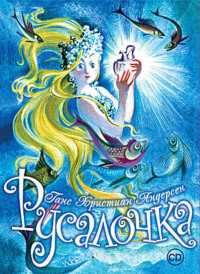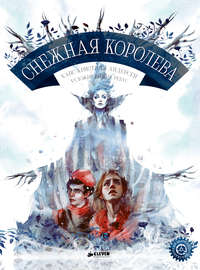 полная версия
полная версияHans Andersen's Fairy Tales. Second Series
"That is a terrible disease for a Snow Man to have," said the yard dog. "I have suffered from it myself, but I got over it. Away, away!" he barked, and then added, "The weather is going to change."
The weather did change. It began to thaw, and as the warmth increased, the Snow Man decreased. He said nothing and made no complaint, which is a sure sign.
One morning he broke and sank down altogether; and behold! where he had stood, something that looked like a broomstick remained sticking up in the ground. It was the pole round which the boys had built him.
"Ah, now I understand why he had such a great longing for the stove," said the yard dog. "Why, there's the shovel that is used for cleaning out the stove, fastened to the pole. The Snow Man had a stove scraper in his body; that was what moved him so. But it is all over now. Away, away!"
And soon the winter passed. "Away, away!" barked the hoarse yard dog, but the girls in the house sang:
"Come from your fragrant home, green thyme;Stretch your soft branches, willow tree;The months are bringing the sweet spring-time,When the lark in the sky sings joyfully.Come, gentle sun, while the cuckoo sings,And I'll mock his note in my wanderings."And nobody thought any more of the Snow Man.
THE FARMYARD COCK AND THE WEATHERCOCK
THERE were once two cocks; one of them stood on a dunghill, the other on the roof. Both were conceited, but the question is, Which of the two was the more useful?
A wooden partition divided the poultry yard from another yard, in which lay a heap of manure sheltering a cucumber bed. In this bed grew a large cucumber, which was fully aware that it was a plant that should be reared in a hotbed.
"It is the privilege of birth," said the Cucumber to itself. "All cannot be born cucumbers; there must be other kinds as well. The fowls, the ducks, and the cattle in the next yard are all different creatures, and there is the yard cock – I can look up to him when he is on the wooden partition. He is certainly of much greater importance than the weathercock, who is so highly placed, and who can't even creak, much less crow – besides, he has neither hens nor chickens, and thinks only of himself, and perspires verdigris. But the yard cock is something like a cock. His gait is like a dance, and his crowing is music, and wherever he goes it is instantly known. What a trumpeter he is! If he would only come in here! Even if he were to eat me up, stalk and all, it would be a pleasant death." So said the Cucumber.
During the night the weather became very bad; hens, chickens, and even the cock himself sought shelter. The wind blew down with a crash the partition between the two yards, and the tiles came tumbling from the roof, but the weathercock stood firm. He did not even turn round; in fact, he could not, although he was fresh and newly cast. He had been born full grown and did not at all resemble the birds, such as the sparrows and swallows, that fly beneath the vault of heaven. He despised them and looked upon them as little twittering birds that were made only to sing. The pigeons, he admitted, were large and shone in the sun like mother-of-pearl. They somewhat resembled weathercocks, but were fat and stupid and thought only of stuffing themselves with food. "Besides," said the weathercock, "they are very tiresome things to converse with."
The birds of passage often paid a visit to the weathercock and told him tales of foreign lands, of large flocks passing through the air, and of encounters with robbers and birds of prey. These were very interesting when heard for the first time, but the weathercock knew the birds always repeated themselves, and that made it tedious to listen.
"They are tedious, and so is every one else," said he; "there is no one fit to associate with. One and all of them are wearisome and stupid. The whole world is worth nothing – it is made up of stupidity."
The weathercock was what is called "lofty," and that quality alone would have made him interesting in the eyes of the Cucumber, had she known it. But she had eyes only for the yard cock, who had actually made his appearance in her yard; for the violence of the storm had passed, but the wind had blown down the wooden palings.
"What do you think of that for crowing?" asked the yard cock of his hens and chickens. It was rather rough, and wanted elegance, but they did not say so, as they stepped upon the dunghill while the cock strutted about as if he had been a knight. "Garden plant," he cried to the Cucumber. She heard the words with deep feeling, for they showed that he understood who she was, and she forgot that he was pecking at her and eating her up – a happy death!
Then the hens came running up, and the chickens followed, for where one runs the rest run also. They clucked and chirped and looked at the cock and were proud that they belonged to him. "Cock-a-doodle-doo!" crowed he; "the chickens in the poultry yard will grow to be large fowls if I make my voice heard in the world."
And the hens and chickens clucked and chirped, and the cock told them a great piece of news. "A cock can lay an egg," he said. "And what do you think is in that egg? In that egg lies a basilisk. No one can endure the sight of a basilisk. Men know my power, and now you know what I am capable of, also, and what a renowned bird I am." And with this the yard cock flapped his wings, erected his comb, and crowed again, till all the hens and chickens trembled; but they were proud that one of their race should be of such renown in the world. They clucked and they chirped so that the weathercock heard it; he had heard it all, but had not stirred.
"It's all stupid stuff," said a voice within the weathercock. "The yard cock does not lay eggs any more than I do, and I am too lazy. I could lay a wind egg if I liked, but the world is not worth a wind egg. And now I don't intend to sit here any longer."
With that, the weathercock broke off and fell into the yard. He did not kill the yard cock, although the hens said he intended to do so.
And what does the moral say? "Better to crow than to be vainglorious and break down at last."
THE RED SHOES
THERE was once a pretty, delicate little girl, who was so poor that she had to go barefoot in summer and wear coarse wooden shoes in winter, which made her little instep quite red.
In the center of the village there lived an old shoemaker's wife. One day this good woman made, as well as she could, a little pair of shoes out of some strips of old red cloth. The shoes were clumsy enough, to be sure, but they fitted the little girl tolerably well, and anyway the woman's intention was kind. The little girl's name was Karen.
On the very day that Karen received the shoes, her mother was to be buried. They were not at all suitable for mourning, but she had no others, so she put them on her little bare feet and followed the poor plain coffin to its last resting place.
Just at that time a large, old-fashioned carriage happened to pass by, and the old lady who sat in it saw the little girl and pitied her.
"Give me the little girl," she said to the clergyman, "and I will take care of her."
Karen supposed that all this happened because of the red shoes, but the old lady thought them frightful and ordered them to be burned. Karen was then dressed in neat, well-fitting clothes and taught to read and sew. People told her she was pretty, but the mirror said, "You are much more than pretty – you are beautiful."
It happened not long afterwards that the queen and her little daughter, the princess, traveled through the land. All the people, Karen among the rest, flocked toward the palace and crowded around it, while the little princess, dressed in white, stood at the window for every one to see. She wore neither a train nor a golden crown, but on her feet were beautiful red morocco shoes, which, it must be admitted, were prettier than those the shoemaker's wife had given to little Karen. Surely nothing in the world could be compared to those red shoes.
Now that Karen was old enough to be confirmed, she of course had to have a new frock and new shoes. The rich shoemaker in the town took the measure of her little feet in his own house, in a room where stood great glass cases filled with all sorts of fine shoes and elegant, shining boots. It was a pretty sight, but the old lady could not see well and naturally did not take so much pleasure in it as Karen. Among the shoes were a pair of red ones, just like those worn by the little princess. Oh, how gay they were! The shoemaker said they had been made for the child of a count, but had not fitted well.
"Are they of polished leather, that they shine so?" asked the old lady.
"Yes, indeed, they do shine," replied Karen. And since they fitted her, they were bought. But the old lady had no idea that they were red, or she would never in the world have allowed Karen to go to confirmation in them, as she now did. Every one, of course, looked at Karen's shoes; and when she walked up the nave to the chancel it seemed to her that even the antique figures on the monuments, the portraits of clergymen and their wives, with their stiff ruffs and long black robes, were fixing their eyes on her red shoes. Even when the bishop laid his hand upon her head and spoke of her covenant with God and how she must now begin to be a full-grown Christian, and when the organ pealed forth solemnly and the children's fresh, sweet voices joined with those of the choir – still Karen thought of nothing but her shoes.
In the afternoon, when the old lady heard every one speak of the red shoes, she said it was very shocking and improper and that, in the future, when Karen went to church it must always be in black shoes, even if they were old.
The next Sunday was Karen's first Communion day. She looked at her black shoes, and then at her red ones, then again at the black and at the red – and the red ones were put on.
The sun shone very brightly, and Karen and the old lady walked to church through the cornfields, for the road was very dusty.
At the door of the church stood an old soldier, who leaned upon a crutch and had a marvelously long beard that was not white but red. He bowed almost to the ground and asked the old lady if he might dust her shoes. Karen, in her turn, put out her little foot.
"Oh, look, what smart little dancing pumps!" said the old soldier. "Mind you do not let them slip off when you dance," and he passed his hands over them. The old lady gave the soldier a half-penny and went with Karen into the church.
As before, every one saw Karen's red shoes, and all the carved figures too bent their gaze upon them. When Karen knelt at the chancel she thought only of the shoes; they floated before her eyes, and she forgot to say her prayer or sing her psalm.
At last all the people left the church, and the old lady got into her carriage. As Karen lifted her foot to step in, the old soldier said, "See what pretty dancing shoes!" And Karen, in spite of herself, made a few dancing steps. When she had once begun, her feet went on of themselves; it was as though the shoes had received power over her. She danced round the church corner, – she could not help it, – and the coachman had to run behind and catch her to put her into the carriage. Still her feet went on dancing, so, that she trod upon the good lady's toes. It was not until the shoes were taken from her feet that she had rest.
The shoes were put away in a closet, but Karen could not resist going to look at them every now and then.
Soon after this the old lady lay ill in bed, and it was said that she could not recover. She had to be nursed and waited on, and this, of course, was no one's duty so much as it was Karen's, as Karen herself well knew. But there happened to be a great ball in the town, and Karen was invited. She looked at the old lady, who was very ill, and she looked at the red shoes. She put them on, for she thought there could not be any sin in that, and of course there was not – but she went next to the ball and began to dance.
Strange to say, when she wanted to move to the right the shoes bore her to the left; and when she wished to dance up the room the shoes persisted in going down the room. Down the stairs they carried her at last, into the street, and out through the town gate. On and on she danced, for dance she must, straight out into the gloomy wood. Up among the trees something glistened. She thought it was the round, red moon, for she saw a face; but no, it was the old soldier with the red beard, who sat and nodded, saying, "See what pretty dancing shoes!"
She was dreadfully frightened and tried to throw away the red shoes, but they clung fast and she could not unclasp them. They seemed to have grown fast to her feet. So dance she must, and dance she did, over field and meadow, in rain and in sunshine, by night and by day – and by night it was by far more dreadful.
She danced out into the open churchyard, but the dead there did not dance; they were at rest and had much better things to do. She would have liked to sit down on the poor man's grave, where the bitter tansy grew, but for her there was no rest.
She danced past the open church door, and there she saw an angel in long white robes and with wings that reached from his shoulders to the earth. His look was stern and grave, and in his hand he held a broad, glittering sword.
"Thou shalt dance," he said, "in thy red shoes, till thou art pale and cold, and till thy body is wasted like a skeleton. Thou shalt dance from door to door, and wherever proud, haughty children dwell thou shalt knock, that, hearing thee, they may take warning. Dance thou shalt – dance on!"
"Mercy!" cried Karen; but she did not hear the answer of the angel, for the shoes carried her past the door and on into the fields.
One morning she danced past a well-known door. Within was the sound of a psalm, and presently a coffin strewn with flowers was borne out. She knew that her friend, the old lady, was dead, and in her heart she felt that she was abandoned by all on earth and condemned by God's angel in heaven.
Still on she danced – for she could not stop – through thorns and briers, while her feet bled. Finally, she danced to a lonely little house where she knew that the executioner dwelt, and she tapped at the window, saying, "Come out, come out! I cannot come in, for I must dance."
The man said, "Do you know who I am and what I do?"
"Yes," said Karen; "but do not strike off my head, for then I could not live to repent of my sin. Strike off my feet, that I may be rid of my red shoes."
Then she confessed her sin, and the executioner struck off the red shoes, which danced away over the fields and into the deep wood. To Karen it seemed that the feet had gone with the shoes, for she had almost lost the power of walking.
"Now I have suffered enough for the red shoes," she said; "I will go to the church, that people may see me." But no sooner had she hobbled to the church door than the shoes danced before her and frightened her back.
All that week she endured the keenest sorrow and shed many bitter tears. When Sunday came, she said: "I am sure I must have suffered and striven enough by this time. I am quite as good, I dare say, as many who are holding their heads high in the church." So she took courage and went again. But before she reached the churchyard gate the red shoes were dancing there, and she turned back again in terror, more deeply sorrowful than ever for her sin.
She then went to the pastor's house and begged as a favor to be taken into the family's service, promising to be diligent and faithful. She did not want wages, she said, only a home with good people. The clergyman's wife pitied her and granted her request, and she proved industrious and very thoughtful.
Earnestly she listened when at evening the preacher read aloud the Holy Scriptures. All the children came to love her, but when they spoke of beauty and finery, she would shake her head and turn away.
On Sunday, when they all went to church, they asked her if she would not go, too, but she looked sad and bade them go without her. Then she went to her own little room, and as she sat with the psalm book in her hand, reading its pages with a gentle, pious mind, the wind brought to her the notes of the organ. She raised her tearful eyes and said, "O God, do thou help me!"
Then the sun shone brightly, and before her stood the white angel that she had seen at the church door. He no longer bore the glittering sword, but in his hand was a beautiful branch of roses. He touched the ceiling with it, and the ceiling rose, and at each place where the branch touched it there shone a star. He touched the walls, and they widened so that Karen could see the organ that was being played at the church. She saw, too, the old pictures and statues on the walls, and the congregation sitting in the seats and singing psalms, for the church itself had come to the poor girl in her narrow room, or she in her chamber had come to it. She sat in the seat with the rest of the clergyman's household, and when the psalm was ended, they nodded and said, "Thou didst well to come, Karen!"
"This is mercy," said she. "It is the grace of God."
The organ pealed, and the chorus of children's voices mingled sweetly with it. The bright sunshine shed its warm light, through the windows, over the pew in which Karen sat. Her heart was so filled with sunshine, peace, and joy that it broke, and her soul was borne by a sunbeam up to God, where there was nobody to ask about the red shoes.
THE LITTLE MERMAID
FAR out in the ocean, where the water is as blue as the prettiest cornflower and as clear as crystal, it is very, very deep; so deep, indeed, that no cable could sound it, and many church steeples, piled one upon another, would not reach from the ground beneath to the surface of the water above. There dwell the Sea King and his subjects.
We must not imagine that there is nothing at the bottom of the sea but bare yellow sand. No, indeed, for on this sand grow the strangest flowers and plants, the leaves and stems of which are so pliant that the slightest agitation of the water causes them to stir as if they had life. Fishes, both large and small, glide between the branches as birds fly among the trees here upon land.
In the deepest spot of all stands the castle of the Sea King. Its walls are built of coral, and the long Gothic windows are of the clearest amber. The roof is formed of shells that open and close as the water flows over them. Their appearance is very beautiful, for in each lies a glittering pearl which would be fit for the diadem of a queen.
The Sea King had been a widower for many years, and his aged mother kept house for him. She was a very sensible woman, but exceedingly proud of her high birth, and on that account wore twelve oysters on her tail, while others of high rank were only allowed to wear six.
She was, however, deserving of very great praise, especially for her care of the little sea princesses, her six granddaughters. They were beautiful children, but the youngest was the prettiest of them all. Her skin was as clear and delicate as a rose leaf, and her eyes as blue as the deepest sea; but, like all the others, she had no feet and her body ended in a fish's tail. All day long they played in the great halls of the castle or among the living flowers that grew out of the walls. The large amber windows were open, and the fish swam in, just as the swallows fly into our houses when we open the windows; only the fishes swam up to the princesses, ate out of their hands, and allowed themselves to be stroked.
Outside the castle there was a beautiful garden, in which grew bright-red and dark-blue flowers, and blossoms like flames of fire; the fruit glittered like gold, and the leaves and stems waved to and fro continually. The earth itself was the finest sand, but blue as the flame of burning sulphur. Over everything lay a peculiar blue radiance, as if the blue sky were everywhere, above and below, instead of the dark depths of the sea. In calm weather the sun could be seen, looking like a reddish-purple flower with light streaming from the calyx.
Each of the young princesses had a little plot of ground in the garden, where she might dig and plant as she pleased. One arranged her flower bed in the form of a whale; another preferred to make hers like the figure of a little mermaid; while the youngest child made hers round, like the sun, and in it grew flowers as red as his rays at sunset.
She was a strange child, quiet and thoughtful. While her sisters showed delight at the wonderful things which they obtained from the wrecks of vessels, she cared only for her pretty flowers, red like the sun, and a beautiful marble statue. It was the representation of a handsome boy, carved out of pure white stone, which had fallen to the bottom of the sea from a wreck.
She planted by the statue a rose-colored weeping willow. It grew rapidly and soon hung its fresh branches over the statue, almost down to the blue sands. The shadows had the color of violet and waved to and fro like the branches, so that it seemed as if the crown of the tree and the root were at play, trying to kiss each other.
Nothing gave her so much pleasure as to hear about the world above the sea. She made her old grandmother tell her all she knew of the ships and of the towns, the people and the animals. To her it seemed most wonderful and beautiful to hear that the flowers of the land had fragrance, while those below the sea had none; that the trees of the forest were green; and that the fishes among the trees could sing so sweetly that it was a pleasure to listen to them. Her grandmother called the birds fishes, or the little mermaid would not have understood what was meant, for she had never seen birds.
"When you have reached your fifteenth year," said the grandmother, "you will have permission to rise up out of the sea and sit on the rocks in the moonlight, while the great ships go sailing by. Then you will see both forests and towns."
In the following year, one of the sisters would be fifteen, but as each was a year younger than the other, the youngest would have to wait five years before her turn came to rise up from the bottom of the ocean to see the earth as we do. However, each promised to tell the others what she saw on her first visit and what she thought was most beautiful. Their grandmother could not tell them enough – there were so many things about which they wanted to know.
None of them longed so much for her turn to come as the youngest – she who had the longest time to wait and who was so quiet and thoughtful. Many nights she stood by the open window, looking up through the dark blue water and watching the fish as they splashed about with their fins and tails. She could see the moon and stars shining faintly, but through the water they looked larger than they do to our eyes. When something like a black cloud passed between her and them, she knew that it was either a whale swimming over her head, or a ship full of human beings who never imagined that a pretty little mermaid was standing beneath them, holding out her white hands towards the keel of their ship.
At length the eldest was fifteen and was allowed to rise to the surface of the ocean.
When she returned she had hundreds of things to talk about. But the finest thing, she said, was to lie on a sand bank in the quiet moonlit sea, near the shore, gazing at the lights of the near-by town, that twinkled like hundreds of stars, and listening to the sounds of music, the noise of carriages, the voices of human beings, and the merry pealing of the bells in the church steeples. Because she could not go near all these wonderful things, she longed for them all the more.
Oh, how eagerly did the youngest sister listen to all these descriptions! And afterwards, when she stood at the open window looking up through the dark-blue water, she thought of the great city, with all its bustle and noise, and even fancied she could hear the sound of the church bells down in the depths of the sea.
In another year the second sister received permission to rise to the surface of the water and to swim about where she pleased. She rose just as the sun was setting, and this, she said, was the most beautiful sight of all. The whole sky looked like gold, and violet and rose-colored clouds, which she could not describe, drifted across it. And more swiftly than the clouds, flew a large flock of wild swans toward the setting sun, like a long white veil across the sea. She also swam towards the sun, but it sank into the waves, and the rosy tints faded from the clouds and from the sea.









